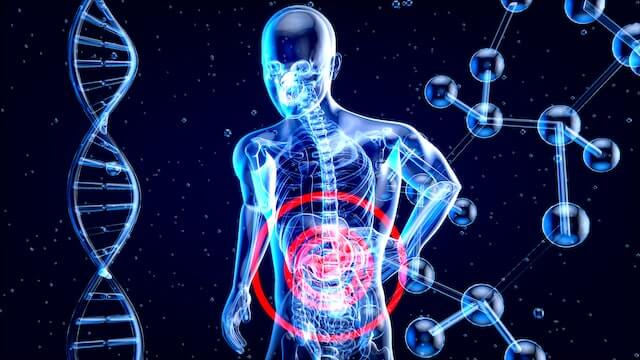Did you know that an estimated 2.3 billion people across the globe are considered “current drinkers” and this number is only expected to grow in the coming years? That means billions of men and women are at risk of being impacted by the more than 200 diseases, health conditions, and injuries brought on by alcohol consumption.
In fact, the World Health Organization (WHO) reports that “5.1% of the global burden of disease and injury is attributable to alcohol” and 3 million deaths occur every year worldwide as a result of alcohol use.
Furthermore, alcohol is harmful to the digestive system. From your essential organs to your gastrointestinal tract, consuming alcohol can wreak havoc on your entire digestive system. To understand how alcohol affects the digestive system, you must understand how the digestive system processes alcohol and what happens from the moment alcohol enters your mouth.
The Effects of Alcohol on the Digestive System
The digestive system consists of numerous body parts and organs beginning with the mouth, esophagus, and stomach down to the small intestine, large intestine, rectum, and anus. The pancreas, liver, gallbladder, and colon are other components of the digestive system that help it function as it should.
The primary purpose of the digestive system is to digest the food and liquid we eat and then eliminate it, all while absorbing nutrients from that food and liquid and converting those nutrients to be used for growth, energy, cell repair, tissue repair, and more. But when you drink alcohol, this digestive process plays out differently.
Acetaldehyde and How Alcohol Affects the Digestive System
The digestive system goes into overdrive when trying to digest alcohol, putting the absorption of nutrients on the back burner. Even if the digestive system is already working to break down other substances like protein, carbohydrates, or fats, incoming alcohol takes priority status.
When you eat food, the walls of the small intestine primarily take on the work of absorbing nutrients. That is not the case with alcohol. Alcohol begins to be absorbed immediately upon consumption through the lining of the mouth and then more as it works its way through the esophagus, stomach, and both the small and large intestines.
The Short-Term Effects of Alcohol on the Digestive System
Once alcohol enters your mouth, it doesn’t take long for it to penetrate the mouth’s saliva and turn into acetaldehyde – a toxic chemical byproduct that is generated when the body works to metabolize alcohol.
Acetaldehyde damages the tissues in your mouth and continues its destructive path once it is swallowed and enters the esophagus, where it goes on to hurt the cells located in that muscular tube. From there, the stomach is its next victim.
Drinking alcohol interrupts the acid production of the stomach. The stomach lining is loaded with mucous cells that work to safeguard the stomach wall from being damaged by stomach acid. Unfortunately, alcohol damages those protective mucous cells. Plus, alcohol decreases the stomach’s capacity to destroy bacteria, leaving the small intestine susceptible to dangerous bacteria.
Next up is the liver. The liver takes the brunt of the alcohol metabolism process. The primary purpose of the liver is to remove toxins from your body as it filters the blood coming from your digestive system, mainly the stomach and intestines.
However, alcohol works contrary to that goal. When the liver works to break down alcohol, it converts alcohol into acetaldehyde. Alcohol makes the liver produce a toxin rather than eliminate one, which can lead to fatty liver disease.
The Long-Term Effects of Alcohol on the Digestive System
As the Centers for Disease Control and Prevention promotes, “The less alcohol you drink, the lower your risk for cancer.”
Remember how alcohol is metabolized into acetaldehyde? Acetaldehyde is known to cause cancer. The National Library of Medicine reports:
“Alcohol metabolism is a major contributor to the increased risk of certain cancers that is associated with heavy alcohol consumption. A crucial factor in this process is acetaldehyde, the first metabolite generated during ethanol oxidation. Acetaldehyde is a carcinogen that can promote cancer development through multiple mechanisms, including interference with DNA replication, induction of DNA damage, and formation of DNA adducts.”
Alcohol consumption increases your risk of developing numerous types of cancer, including:
- Mouth
- Throat
- Esophagus
- Pharynx
- Larynx (voice box)
- Liver
- Colon
- Rectum
- Breast (in women)
When you drink alcohol, you put your digestive system at risk of health complications for years to come.
Improving Gut Health in Recovery
When you think of how alcohol affects the digestive system, the answer is quite apparent. Alcohol destroys the digestive system piece by piece and not a single part of the digestive system goes unscathed.
But when you stop drinking alcohol, you give your digestive system a fighting chance to improve and recover from acetaldehyde exposure.
Restoring your digestive system can be a tricky process, but incorporating a dietary supplement into your daily regime can make all the difference.
BioRebalance Restore is a dietary supplement that is designed to not only improve your gut health, but reduce your cravings for alcohol. Created by orthomolecular nutritional experts after hours upon hours of scientific research, BioRebalance Restore works to:
- build up your gut microbiome
- enhance your liver function
- boost your levels of serotonin, endorphins, and GABA
- improve your brain health on a cellular level
- revamp your nervous system
- eliminate cravings
- produce natural energy
- encourage better sleep
Just how alcohol affects the digestive system, nutrient deficiencies affect your digestive system as well. Alcohol gets in the way of your body’s ability to absorb nutrients, and that’s why a key element of improving the function of your digestive system is creating the correct balance of nutrients within your body.
BioRebalance Restore is made with the highest quality nutrients backed by science. With zero fillers and no artificial flavors or sweeteners, BioRebalance Restore could be your ticket to decreasing your alcohol consumption and increasing the natural abilities of your digestive system.
Order yours today and begin your journey to better digestive health!
Dr. Rebeca Eriksen, PhD MSc BSc (Hons) RD, is the Co-Founder at BioRebalance. She has a PhD in Nutritional Genetics from Imperial College London, and over ten years of clinical experience designing custom nutritional repair regimens for patients recovering from alcohol addiction and other disorders.
- Dr. Rebeca Eriksenhttps://biorebalance.com/author/dr-rebeca-eriksen/
- Dr. Rebeca Eriksenhttps://biorebalance.com/author/dr-rebeca-eriksen/
- Dr. Rebeca Eriksenhttps://biorebalance.com/author/dr-rebeca-eriksen/
- Dr. Rebeca Eriksenhttps://biorebalance.com/author/dr-rebeca-eriksen/

